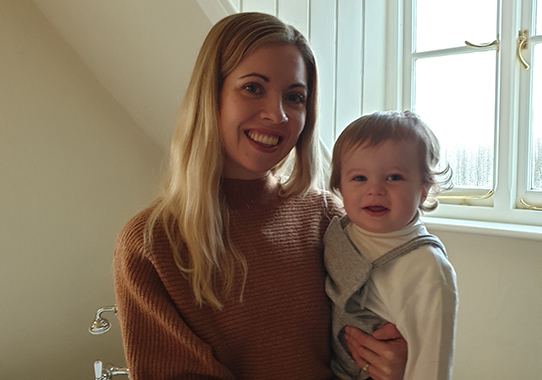Five tips to help you study or work from home with young children
26/03/2020

In these uncertain times, we are all finding ourselves facing new challenges and living within new confines. The COVID-19 pandemic has pulled the rug from beneath all our feet – but, while life has changed dramatically for the foreseeable future, it goes on.
Here in the Cranfield community, we are all trying our best to study and work from home. Face-to-face lectures have been replaced with online ones; staff are working remotely wherever possible; and we are all familiarising ourselves with new tools and innovative ways of communicating with our fellow students and colleagues.
It’s a test for us all – but what happens when you throw young children into the mix too? We all know that looking after little ones is a full-time job in itself – it’s why we rely on nurseries, childminders, grandparents and friends! As the parent of an 18-month-old little boy, I know how all-consuming looking after a small person is – it’s certainly interesting trying to fit in a day’s work as well!
So, while we remain on lockdown, how can you successfully balance these conflicting priorities?
1 – Reset your expectations
This applies to all areas of life in the current climate. Life is not normal right now, so don’t expect it to be. Once you accept that some things will have to give, you afford yourself the freedom to do the best that you can.
Perhaps you usually get your best work done early in the morning but now you are navigating the busyness of breakfast time and setting up your kids with an activity or some toys to keep them entertained and occupied, before you can even start thinking about your to-do list. Or maybe your children have limited screen time but now you have to concede an extra half hour or two to enable you to finish a task.
Whatever approach helps you is the right one during these unprecedented times.
2 – Talk to your boss or supervisor
Now is the time for openness and transparency, so speak to your boss or supervisor and tell them honestly about the current obstacles you are facing to get work done. By opening up the lines of communication, you can ensure that there are no misunderstandings. And don’t be afraid to speak up – if you’ll struggle to reliably make a conference call at the same time every day, then say – but suggest an alternative, like a one-to-one catch-up at a more convenient time.
Keep in touch as much as you can throughout the day – within our marketing team we are successfully using Microsoft Teams for group video calls, as well as for sending instant messages to one another. We also have a group on WhatsApp, which doubles up nicely as a forum for sharing the many coronavirus-related gifs and memes, in a bid to lighten the mood!
3 – Create a (flexible) schedule
Having the semblance of a routine can help you to make the best use of your time. If your child still naps, then that’s the obvious place to start – you could utilise that time to do any work that requires maximum concentration. If you have a partner who is also working at home, then why not take it in turns to work and parent in designated blocks of time. For older children, you can communicate with them about what different parts of the day will consist of – whether that’s educational activities, crafts, going for a walk or “quiet time”.
But don’t put yourself under pressure if your schedule doesn’t quite go to plan. Take each day as it comes and reassess if you need to. And make sure you factor in some down time too – you’ll be far more productive and energised if you take time to relax.

4 – Eat the frog
Mark Twain famously said: “If it’s your job to eat a frog, it’s best to do it first thing in the morning. And if it’s your job to eat two frogs, it’s best to eat the biggest one first.” In essence, the concept of eating the frog is avoiding procrastination and just getting on with that tricky task on your to-do list.
Now, you might not be able to eat the frog first thing in the morning when you’re looking after children too, but the point is: when you do get time to focus, use that time to tackle the most urgent priorities (however complex and difficult they may be). That way, you have a sense of achievement and concrete successes that you can feed back to your boss or supervisor. Then you can address the less intensive priorities as and when throughout the day.
5 – Be kind to yourself
Most importantly, cut yourself some slack. It can easily feel like you’re trying to do everything and succeeding at nothing in this kind of a situation; that neither your work nor your children are getting the best of you. As many people are saying (on Twitter, in forums, in late-night phone calls), now is the time to survive, not to thrive.
So stop the negative self-talk and focus on what you are achieving: you’re spinning multiple plates and doing your best to keep them all in the air! It’s a difficult and unnerving time for all of us, so we can only do what we can in such exceptional circumstances.
And remember: this too shall pass.
Categories & Tags:
Leave a comment on this post:
You might also like…
Keren Tuv: My Cranfield experience studying Renewable Energy
Hello, my name is Keren, I am from London, UK, and I am studying Renewable Energy MSc. My journey to discovering Cranfield University began when I first decided to return to academia to pursue ...
3D Metal Manufacturing in space: A look into the future
David Rico Sierra, Research Fellow in Additive Manufacturing, was recently involved in an exciting project to manufacture parts using 3D printers in space. Here he reflects on his time working with Airbus in Toulouse… ...
A Legacy of Courage: From India to Britain, Three Generations Find Their Home
My story begins with my grandfather, who plucked up the courage to travel aboard at the age of 22 and start a new life in the UK. I don’t think he would have thought that ...
Cranfield to JLR: mastering mechatronics for a dream career
My name is Jerin Tom, and in 2023 I graduated from Cranfield with an MSc in Automotive Mechatronics. Originally from India, I've always been fascinated by the world of automobiles. Why Cranfield and the ...
Bringing the vision of advanced air mobility closer to reality
Experts at Cranfield University led by Professor Antonios Tsourdos, Head of the Autonomous and Cyber-Physical Systems Centre, are part of the Air Mobility Ecosystem Consortium (AMEC), which aims to demonstrate the commercial and operational ...
Using grey literature in your research: A short guide
As you research and write your thesis, you might come across, or be looking for, ‘grey literature’. This is quite simply material that is either unpublished, or published but not in a commercial form. Types ...






